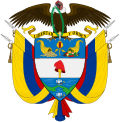Significant issues
Belize is part of the cooperation projects within the framework of the Cooperation Strategy with the Caribbean Basin. [3] Within this project, Belize has received cooperation in various aspects, such as: [4]
- Public service: Colombia has trained in various aspects of public service, including quality management, audits, public water, sewerage and basic sanitation services (management and rates), and citizen service.
- Security: Colombia has trained the Belizean armed forces in maritime and air interdiction for the fight against drug trafficking, substance control in ports and airports, air defence, money laundering, violence prevention, criminal intelligence, police transparency, and drug supply.
- Social Security: The areas in which Belize has received assistance are: payment of subsidies, poverty reduction.
- Development: Second-tier banking, technological development and innovation, small and medium-sized enterprises, entrepreneurship and sustainable production models are the areas in which Belize has received technical advice from Colombia.
On the other hand, Colombia helps most of the Central American countries, along with Mexico through the Mesoamerica Project. Belize has benefited from infrastructure, tourism and environmental projects. [5]
Dispute with Guatemala
At the 2012 meeting between the Foreign Ministers of Colombia and Guatemala, the Andean country congratulated the governments of Belize and Guatemala for bringing this dispute to a popular consulate. This demonstrates that Colombia applauds peaceful solutions to disputes and avoids taking sides in this conflict. [6]
Drug trafficking
In 2011, Belize was placed on the United States' blacklist for drug trafficking, due to its location making it a corridor for drug transport to the United States and the insular Caribbean. Therefore, Belize, like Colombia, has strengthened its ties in the fight against the drug problem through multilateral forums, the main one being the OAS. [7]
This page is based on this
Wikipedia article Text is available under the
CC BY-SA 4.0 license; additional terms may apply.
Images, videos and audio are available under their respective licenses.

